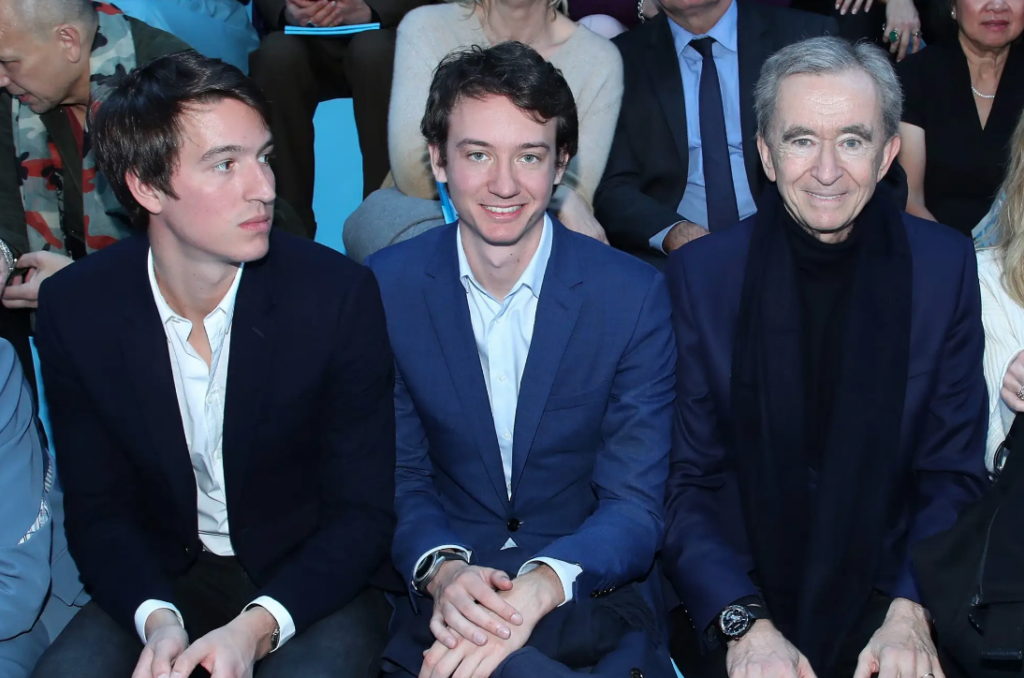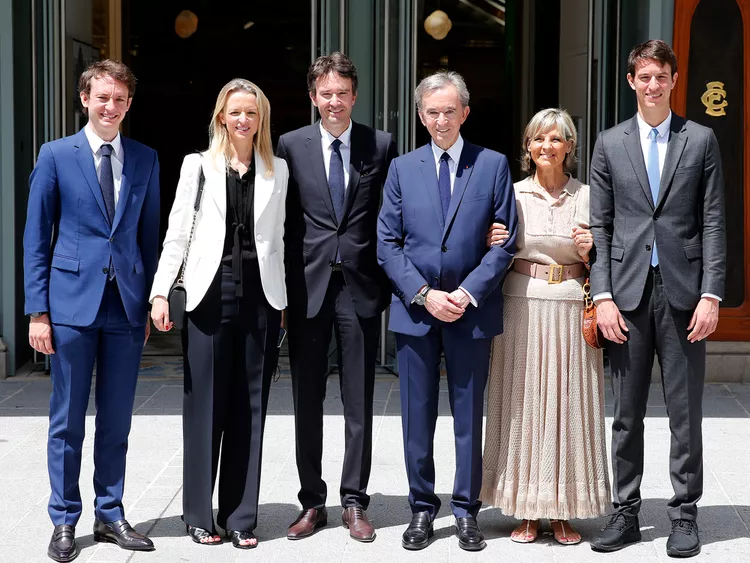As the world’s leading luxury goods conglomerate, LVMH (Moët Hennessy Louis Vuitton) boasts an impressive portfolio of 75 prestigious and familiar brands like Dior, Fendi, and Sephora. To consumers of luxury goods, LVMH is regarded for its attention to craftsmanship and quality. To family businesses worldwide, LVMH may be considered the quintessential example of a well-oiled family operation.
There have been significant leadership developments at LVMH since we published our original profile on the Arnault family, led by patriarch Bernard, a year ago:
- At the LVMH annual Board meeting in April, shareholders approved the nominations of Bernard’s sons, Alexandre, 31, and Frédéric, 29, to the Board.
- They join Bernard’s two eldest children, Delphine, 48, and Antoine, 46, who took their own seats at around similar ages.
- Jean, the fifth and youngest Arnault at age 26, is expected to be nominated in the coming years.
As more Arnault family members move into positions of power, the Board’s makeup begs the question: Is there such a thing as too much or too little family within a family business? Having found some of LVMH’s success through takeovers of other family businesses with failed succession plans, over the years, Bernard has learned what not to do. For LVMH, the risk is not whether Bernard has done everything in his power to secure his family’s control. The risk lies in whether he can find the delicate balance between family involvement and external management expertise to continue driving the success that made Bernard Arnault one of the richest people in the world.
Finding the balance — and maintaining it too
In September 2023, CMG profiled Bernard and his LVMH empire and celebrated the 75-year-old luxury magnate’s mastery of two key ingredients of successful family businesses: the business of the business and the business of the family. All five of Bernard’s children hold top management roles at LVMH, and each has been primed for leadership at the company from a young age. Although the family is private about succession planning, there’s value in assessing how Bernard has balanced promoting family members while retaining and growing non-family talent as well.
Bernard is skilled at identifying the external expertise needed to join forces with his family. He recognizes the crucial role these non-family members play in moulding and maintaining the LVMH empire. Several non-family colleagues are the family’s trusted confidantes and dedicate their careers to LVMH.
One such veteran is Antonio Belloni, who stepped down from his positions as Group Managing Director and Chairman of the Executive Committee of LVMH Group last April. Replacing him in both roles is Stéphane Bianchi, a non-family executive who has advanced quickly since joining LVMH in 2018 — meaning by LVMH standards, he’s a newcomer. Bianchi was promoted from CEO of LVMH Watches and Jewelry Division, where he directly oversaw and built rapport with both Alexandre and Frédéric Arnault.

Belloni and Bianchi are strong examples of what Bernard seeks in non-family executives, and why he empowers them at LVMH: They understand family businesses and have become part of the broader “LVMH family”. Belloni loyally worked alongside Bernard for 23 years and was known as his “number two”. Upon Belloni’s departure, Bernard said, “Toni has been an essential partner for me and a very important member of the LVMH family.” Regarding Bianchi, Bernard stated, “Since joining the Group, Stéphane Bianchi has demonstrated rare leadership and management qualities while immersing himself in the Group’s entrepreneurial and family culture.”
Bianchi came to LVMH in 2018 after stepping down as Chief Executive of another family-run company, Yves Rocher. He’d held that position since age 33 when he replaced the company’s founder. Bianchi says he feels best suited to work with family businesses because they are not only interested in money. Family businesses, in his words in an interview with the NY Times, “are investing for their long-term vision, and I’d like to think that what I am doing is helping them to continue their family’s story.” Bianchi is an apt choice for Bernard who values his family’s continuity above all. A source close to the group told the Financial Times: “For Arnault, the family unit is sacred, so everything is organized around that.”
As Bianchi settles into the role as Bernard’s new right-hand man, Belloni has transitioned to President of LVMH Italy while also being “in charge of strategic missions for Bernard Arnault”, as stated in an LVMH announcement. Other longstanding associates also remain stable lieutenants at LVMH, even when their roles shift. Sidney Toledano has been with LVMH and the Arnault family since Bernard recruited him in 1993. Over the decades, he has held numerous top positions, including Chairman and CEO of LVMH’s Fashion Group, and longstanding mentor to Delphine Arnault. When Toledano left the Executive Committee early this year, Bernard named him as his Personal Advisor. “He still has a tremendous amount to bring us,” said Arnault.
What non-family members bring to the boardroom table
When the appointments of Alexandre and Frédéric Arnault were recently proposed to the LVMH Board in January, there was also a third, non-family appointment proposed: Henri de Castries. Today, de Castries is the Lead Director of the Board and represents an intentional strategic move by Bernard to ensure balance.
De Castries brings invaluable outside knowledge and expertise from various industries to the role. He has served on the corporate boards of numerous organizations, including HSBC, Nestlé, and Stellantis, and has sat on committees and advisory boards of over a dozen non-profit organizations. He spent 27 years at AXA, a multinational insurance company, including 17 years as Chief Executive, where he was regarded as one of the most respected executives in France. The President of France once offered de Castries the job of Finance Minister; de Castries turned it down.
As Lead Independent Director at LVMH, de Castries’s role on the Board is both to (1) support and (2) appraise the performance of the Chairman of the Board, Bernard Arnault. The intermediary between the Chair and the rest of the Board, de Castries is also the independent counter-power to Bernard’s Board leadership. De Castries’ appointment to this role demonstrates how much Bernard values highly skilled outsiders as independent eyes monitoring the business and the family. Neither an Arnault family member nor an employee of LVMH, de Castries has gained diverse professional experience in fields very different from the luxury goods industry. His unique position gives Bernard a more holistic view of LVMH from a seasoned perspective.
The future of the Arnaults and LVMH
While many forms of mentorship continue, Bernard’s five children are now accelerating through the LVMH ranks into high-powered positions that reinforce the family’s reign. At the same time, structural changes at Agache, the family holding company, have been recently implemented to secure family unity and long-term control over shareholding and strategy decisions. Bernard has converted Agache into a joint-stock partnership, with share capital held equally by the Arnault children. According to Agache’s statement: “The new structure will permit to perpetuate the family control over the long term.”
Bernard welcomes talented non-family members into the business, but his long-term vision for the empire is family-oriented. As the next-gen advances at LVMH, more experienced executives are moved to facilitate the Arnaults’ growth and career development. Bernard has a reputation for removing anyone who doesn’t deliver top results, but some speculate that approach may change now that the executives being put to the test are his own offspring.

Transitioning experienced executives out of roles comes with many risks, as does putting inexperienced or under-qualified family members in positions of power. Empowering the family could also come at the cost of attracting future top external talent. If Bernard favours his children over more qualified candidates for prestigious roles at the company, it could greatly impact operations, and LVMH’s reputation among shareholders and industry peers, not to mention attitudes throughout personnel.
Role changes for any of the five Arnault children at LVMH are the subject of great speculation, as outsiders search for clues as to who will one day succeed Bernard in leading the company. Bernard will need to continuously recalibrate to maintain the balance between family and external expertise to keep both businesses thriving.
For further reading/listening:
- Read our original profile of the family here.
- Listen to Acquired’s podcast, “The Complete History and Strategy of LVMH”.
Jessika McQueen is a freelance writer based in Toronto.
Download and read the article as a PDF here.
